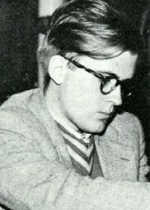Larsen Bent (04.03.1935 – 09.09.2010)
 Danish Grandmaster (1956) who was living for many years in Argentina. He was awarded the first Chess Oscar in 1967.
Danish Grandmaster (1956) who was living for many years in Argentina. He was awarded the first Chess Oscar in 1967.
Larsen learned to play chess at the age of six and at the age of 12, he joined the local chess club. He improved his playing skills constantly, especially when he left for Copenhagen to study civil engineering.
In 1951 at Birmingham he tied for fourth and in 1953 at Copenhagen, he shared the fifth place. He became the Danish Champion for the first time in 1954 and regained his title every time he took part (1955, 1956, 1963, and 1964). As a member of the Danish team, he participated in the World Chess Olympiads in the 1954 Olympiad and in Moscow in 1956, where he showed the best individual results on the first board, winning 14 points out of 18 and was awarded the Grandmaster title. Despite this success, he preferred his civil engineering studies to a professional chess career. He began to compete seriously winning at Mar del Plata 1958 and Wijk aan Zee 1960 and 1961. He performed with remarkable success in two strong tournaments at Beverwijk in 1960, tying for first with Tigran Petrosian, and in 1961, he shared the first place with Boris Ivkov.
Following his military service for two years, he returned to playing in international chess events, showing good results at Amsterdam in 1964, where he shared the first prize with Vassily Smyslov, Boris Spassky, and Mikhail Tal.
The following year he played in the Candidates Match and beat Boris Ivkov with a score of 5½-2½, but in the semi-final was defeated by Mikhail Tal, 4½-5½. Having won in 1967 at Sousse Interzonal, being 1½ points ahead of his rivals, he played a match with Lajos Portisch 5½-4½ in his favor but lost a match to Boris Spassky by a score of 2½-5½. In 1970 at the Palma de Majorca Interzonal tournament, Larsen shared second place with Robert Hubner, Efim Geller and Robert Fischer with a score of +9=12-2 and won a match with Wolfgang Uhlmann 5½-3½, but was beaten by Bobby Fischer with a shocking score of 0-6. He won his third Interzonal tournament at Biel in 1976 with a score of +8=9-2, but in the first Candidates Match in 1977, he was beaten by Lajos Portisch – 3½-6½. In 1970 he was head of the World’s Team in the Century Match, playing on the First Board with Spassky, scoring +1=1-1 and +1 with Stein.
Besides Iinterzonal tournaments, in the period between 1958 and1990, he took part in more than 60 chess events, and gained 24 first or equal first and 10-second places. He showed especially brilliant results, having won first prizes in 1967 at Havana, followed by Mark Taimanov and Vassily Smyslov, at Palma de Majorca, equal with Klaus Darga, in front of Mikhail Botvinnik, Vassily Smyslov, Lajos Portisch; in 1968 at Monte Carlo, followed by Mikhail Botvinnik, Vassily Smyslov and Vlastimil Hort; in 1969 at Busum and Palma de Majorca in front of Tigran Petrosian, Boris Spassky and Viktor Korchnoi and in 1970 at Lugano. He did well and was the winner at Teesside 1972, Hastings 1972-73, Manila 1973, Orense 1975, Ljubljana-Portoroz 1977, Buenos Aires 1979 and 1980, Naestved 1985, equal with Vaganian and Browne, Reykjavik 1985, London 1989 and 1990 and New York 1990. Since then he participated in ‘veteran’ events like Women vs. Veterans or the Memorial Petrosian in 1999.
He represented Denmark six times in Olympiad, always on first board. He won three board medals, one gold, and two bronze.
Larsen is considered to be a good endgame player, playing a solid positional game, his style is rather aggressive, and he usually prefers risky combinations to an acceptance of a draw.
Lev Polugaevsky said that playing with Larsen, one could feel a fighter with a terrible temper and energy, his terrible sportive spirit (spite), his eagerness to win, his bravery…
Being a chess journalist, he is an author of numerous chess books, articles for several chess magazines and theoretical analyses of games. He published his autobiographical volume “Larsen’s Selected Games of Chess 1948-69” (1971), translated into several languages, and “Larsen’s Good Move Guide” (1982). : 2660 in 1971.
Peak rating: 2660 in 1971.



